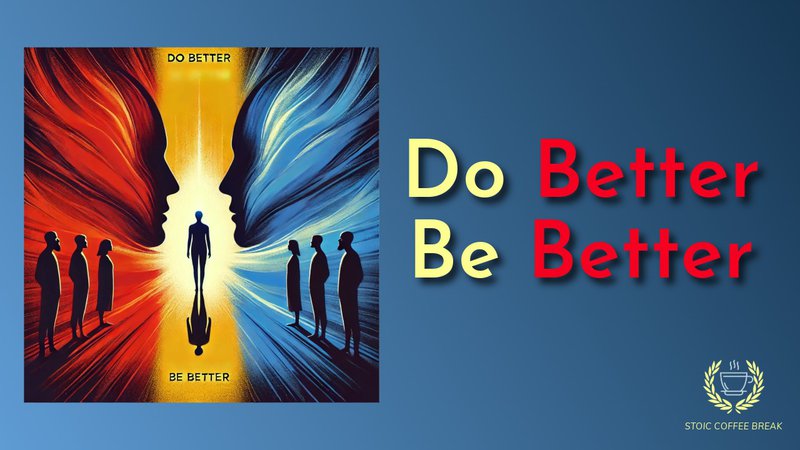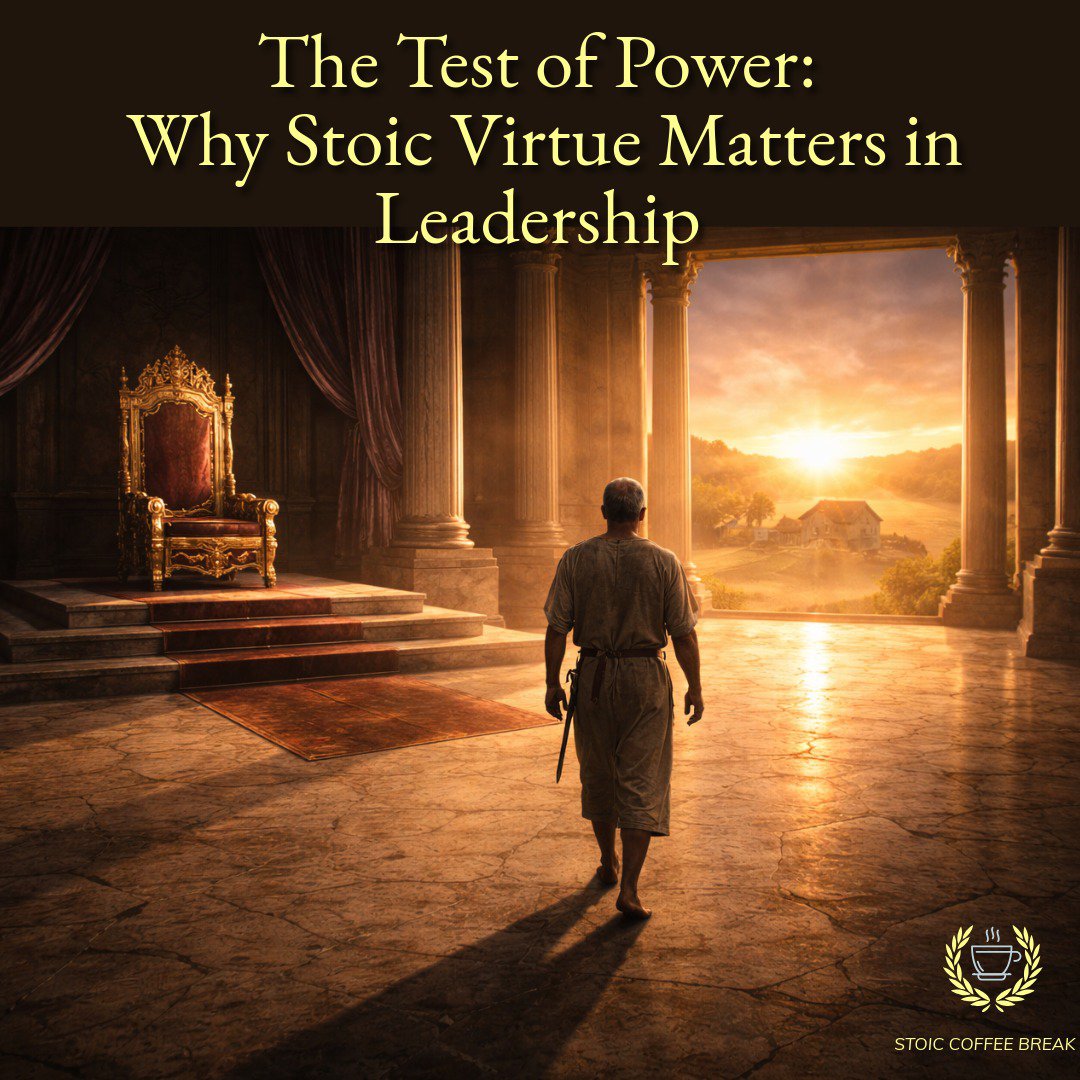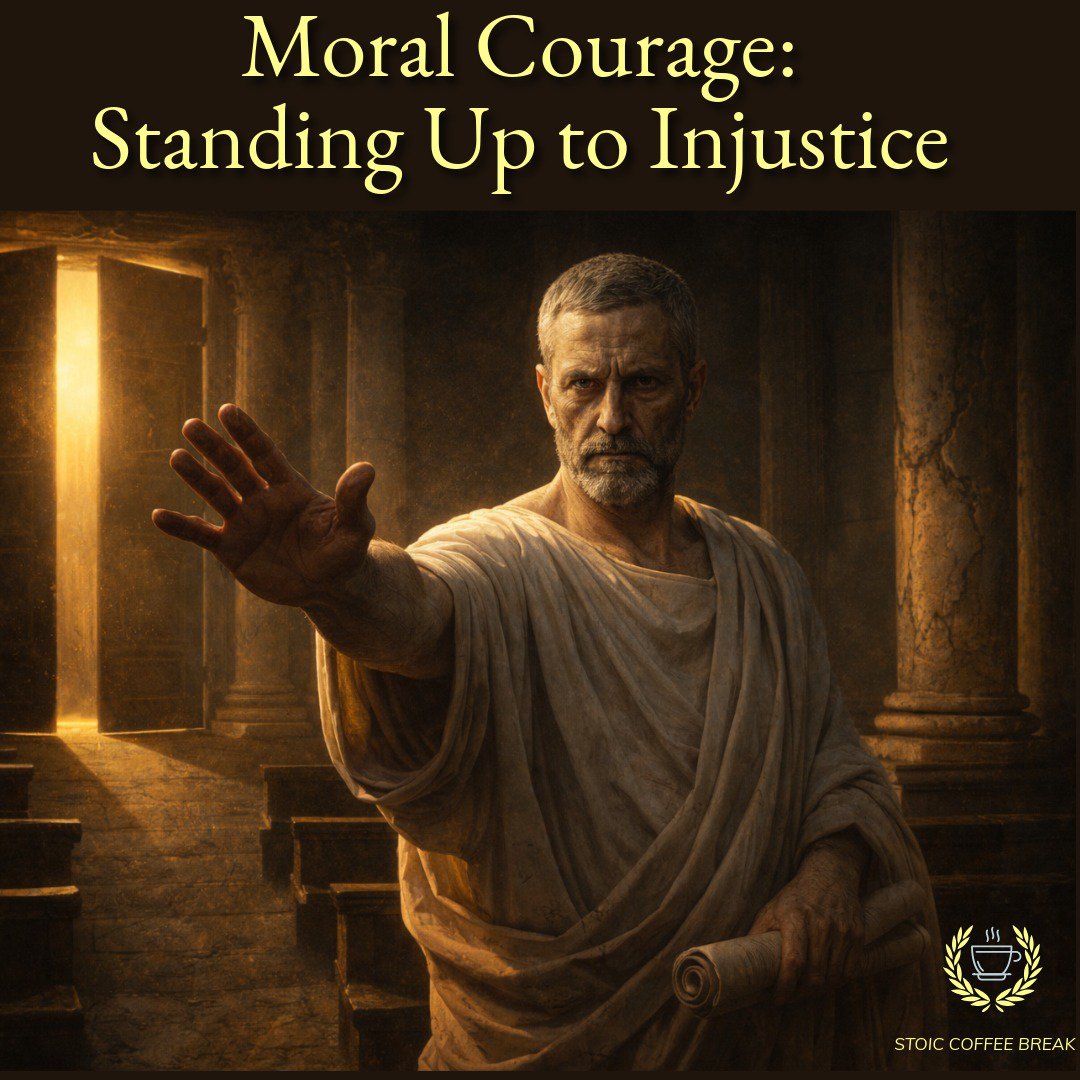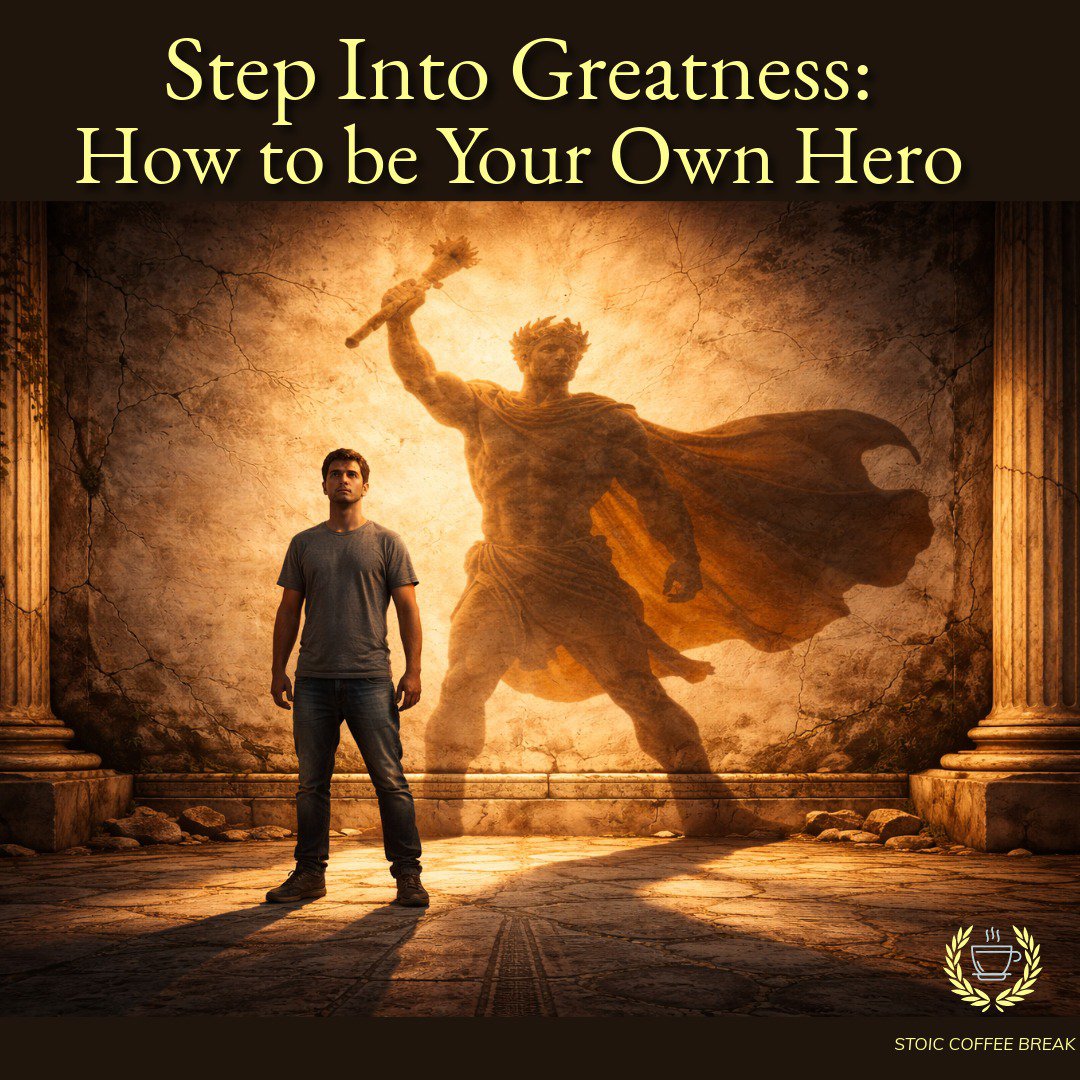
In times of political division, it’s easy to be swept away by anger, resentment, and fear. But what does that accomplish? Does your anger towards those that disagree with you help yourself or the world? In this episode I want to talk about the importance of maintaining your Stoic principles in times of turmoil.
“The essence of good and evil consists in the condition of our character. And externals are the means by which our character finds its particular good and evil.”
—Epictetus
In today’s political climate it often seems easier just to trash those that you disagree with than to have a conversation. And why is that? Why is it so hard? It’s because we feel frustrated that they don’t see the world like we do. They have their own thoughts and opinions and we don’t like them. We want them to stop acting like they are, and act like we want them to.
But when it comes to politics, we need to remember that one of the core tenants of Stoicism is that we can’t control the actions of others—only how we respond. So when we have a political argument with someone, the real question isn’t, “How can I make the other side lose?”, but rather, “How can I show up in the world with wisdom, justice, courage, and temperance?”
Remember that we should follow the advice of Marcus Aurelius: “Waste no more time arguing about what a good man should be. Be one.” — Marcus Aurelius
This episode isn’t about taking sides. It’s about raising the bar. It’s about asking, “Am I acting in a way that aligns with my values? Am I making the world better or worse by how I engage with others?”
1. The Cost of Tribalism: Why Division Hurts Us All
The tendency to see politics as “us vs. them” isn’t new—it’s human nature. But tribalism poisons our ability to think clearly. We assume the worst about the other side while giving our own side the benefit of the doubt. Tribalism makes enemies out of people who are our fellow citizens, neighbors, and even family members.
Example: How friendships and family relationships have been fractured because of political identity—people who once saw each other with kindness now only see “the enemy.”
“What injures the hive, injures the bee.” — Marcus Aurelius
When we treat others badly or cause suffering because we see them as the enemy, then we not only harm them, but we harm all of society. Stoicism asks us to zoom out. To remember that our common humanity matters more than your side winning.
So the Stoics have the concept of cosmopolitanism, meaning that everyone is a part of the cosmos, and part of the same human family. Epictetus reminds us, “Do as Socrates did, never replying to the question of where he was from with, ‘I am Athenian,’ or ‘I am from Corinth,’ but always, ‘I am a citizen of the world.’”Therefore, we should practice kindness and find ways to support others regardless of nationality, race, or sexual orientation. We need to work together to build a better society, not create divisions.
This is what democracy is all about. It’s about finding ways to work together to solve the problems we have in society. It’s not about which side wins and loses, but how do we work together to govern ourselves and contribute to the greater good.
So I’m going to address something straight on. If you are hateful towards some group because they are a different nationality, race, or gender and you want to adopt the principles of Stoicism, you’ve missed the mark. If you delight in the suffering of others, you’re not being a Stoic. A Stoic seeks to practice wisdom, courage, justice, and discipline and to build a better and equitable society for everyone, not just those that you think deserve it.
It takes wisdom to be educate yourself on issues that afflict society, and to see it from multiple sides. It take justice to stand up advocate for fairness and reduce suffering of other. It takes courage to compromise with those you disagree with, and go against those on “your side”, in order to do the right thing. It takes discipline to not give in to fear mongering and manipulation and continual ask yourself if you’re doing the right thing.
Reflection Question:
Are you engaging in political conversations in a way that heals or deepens division?
2. Fear Is the Enemy of Wisdom
Many political movements today are fueled by fear—fear of losing power, fear of change, fear of the unknown, fear of the “other”. But fear makes us reactive. It makes us irrational. And worst of all, it makes us susceptible to manipulation.
Political leaders use fear to rally supporters against others who they blame for what they believe is wrong in the world. This includes directing hatred against ethnic or religious groups, political parties, people of different race or gender. It’s all about pointing the finger at someone else for their problems, rather than finding solutions to the problems that we face.
When you allow others to make you angry, you’ve given away your power. You are letting someone else have control over you. The Stoics talk about this all the time, recognizing that anger is one of the most important emotions for you to have control over. It’s easy to give into fear and anger, but a Stoic practices discipline and doesn’t let fear rule over them.
As Seneca explains:
“Anger [is] a short madness: for it is equally devoid of self control, regardless of decorum, forgetful of kinship, obstinately engrossed in whatever it begins to do, deaf to reason and advice, excited by trifling causes, awkward at perceiving what is true and just, and very like a falling rock which breaks itself to pieces upon the very thing which it crushes.”
The Stoics warned frequently about the dangers of hate and anger because they recognized how destructive it is, not just for society but for each of us personally. Have you ever been around someone who is angry and hateful? They don’t step up and try to do what they can to make the world a better place. They’re unhappy and blame everything that’s wrong on things outside of them.
I’ve come to the conclusion that anger is fear in action, and often that fear comes from being mislead or being misinformed. If you’re angry or hateful towards another group of people and want to see them suffer, then you really need ask yourself: “What am I afraid of?”
If you find that you are consistently angry at others for political reasons, or blame others for what’s wrong in your life, then maybe you need reevaluate your values. Do you want to live in a world full of hate and anger? Do you want to live in a society where people are punished for not thinking the same or because they are different? How would you feel if you were on the receiving end of that hate?
Another downside of fear-driven politics is that they often lead to policies that hurt the very people who support them, such as when economic policies are enacted that benefit corporations or the extremely wealthy while leaving working-class or poor supporters struggling.
Instead of being led by fear, be led by wisdom. Seek to understand before reacting. Think about what story you are telling yourself, because it’s your perspective on something that causes the fear you feel. As Epictetus reminds us:
“Man is disturbed not by things, but by the view he takes of them.” — Epictetus
Reflection Question:
Are your political views based on principles—or just fear of the other side? When you feel anger or fear about something political, pause and ask, Is this fear justified? Is it based on facts or on narratives designed to keep me afraid?
3. Justice
One of the four Stoic virtues is justice, which means fairness, equity, and concern for the well-being of others. It means ensuring that all people—regardless of race, religion, gender, or background—are treated fairly under the law. It means also means that we practice compassion and kindness even with those we disagree with.
The Stoics taught justice as one of the four virtues because they understood that we are social animals and that society moves forward when we work together for the common good, rather than just what benefits us personally.
Marcus Aurelius tells us over and over, we were made not for ourselves but for others, and our nature is fundamentally unselfish. In our relationships with others we must work for their collective good, while treating them justly and fairly as individuals. He did his best to judge cases fairly and push for laws that benefited society as a whole, rather than enriching himself.
Justice means taking responsibility—not just for our personal actions but for the kind of society we support. It’s about recognizing the justice is not about punishing others, but standing up for others. It’s about creating a fair and equitable society for everyone, not just those on “our side”.
Reflection Question:
Are you standing for justice, or just for what benefits you personally?
4. Strength Is Not Cruelty
There’s a dangerous idea that kindness is weakness and that to “win,” we must be ruthless. Stoicism teaches the opposite: True strength is restraint, discipline, and wisdom. Causing suffering of others not only makes our society worse off, but ruins our character
Marcus Aurelius had immense power as Emperor, but he led with humility. He could have ruled through fear, but he chose reason and justice. He created programs to help rehabilitate soldiers returning from war, and help to integrate them back into society. When plagues and floods ravaged Rome he sold his own possessions to help those who were suffering.
“All cruelty stems from weakness.” — Seneca
Which do you think is stronger? Someone who try to punish those they disagree with, uses their power to harm those they feel insulted them or who are weaker than them? Or, someone who protects others, is willing to engage in respectful conversation with those they disagree with, and who looks out for the common good for all?
Being cruel doesn’t make you strong. Insulting others doesn’t make you clever. And dismissing the struggles of others doesn’t make you wise. Strength is in self-mastery. Strength is about alleviating suffering, and standing for what’s right, even when it’s unpopular.
Reflection Question:
Are you mistaking aggression for strength? Or are you practicing true justice?
5. What Can You Do? Stoic Actions for a Better Society
- Engage with honesty. Seek truth, not just validation of your beliefs.
- Debate with virtue. Argue to understand, not to destroy.
- Lead by example. Be the change you want to see in the world, instead of complaining that others won’t change.
- Resist manipulation. Ask: Who benefits from me being afraid or angry?
- Extend humanity. Even if you disagree with someone politically, treat them with respect. Stand up and do the right thing—supporting those in need, relieving suffering in the world.
Closing: The Higher Standard
- If you want a better country, a better world—it starts with you.
- Don’t fall for the trap of outrage, tribalism, and fear. Raise the bar. Do better, be better.
- Stoicism isn’t passive. It’s about taking control of what you can: your own mind, actions, and the way you contribute to the world.
Let me leave you with this final quote:
“Live out your days in peace, free from anger, fear, and compulsion, doing the work of a good person. You have been made by nature for this.” — Marcus Aurelius
My book Stoicism 101 is available! Order here!
Find out more at https://stoic.coffee
Watch episodes on YouTube!
Find me on linkedIn, instagram, twitter, or threads.
Thanks again for listening!


